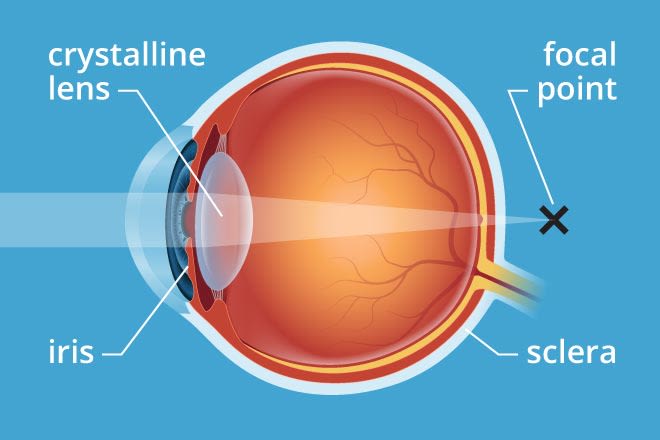Presbyopia is a condition that affects people as they age and results in difficulty seeing objects up close. It is caused by the natural loss of elasticity in the eye, which makes it harder for the lens to focus on close objects. In this blog post, we will discuss what presbyopia is, what causes it, and how you can treat it!
Contents
What Is Presbyopia?
 Presbyopia is an age-related disorder of the eye that affects near vision. It is characterized by difficulty focusing on nearby objects and small print, especially when not wearing corrective eyeglasses or contact lenses. Presbyopia typically affects individuals between the ages of 40 and 55 but can occur in younger people as well.
Presbyopia is an age-related disorder of the eye that affects near vision. It is characterized by difficulty focusing on nearby objects and small print, especially when not wearing corrective eyeglasses or contact lenses. Presbyopia typically affects individuals between the ages of 40 and 55 but can occur in younger people as well.
It is estimated that more than 1.3 billion people around the world suffer from presbyopia, making it the most common age-related eye condition. Many people believe that this is a natural part of the aging process, but this is not necessarily true. While advancing age is the primary factor that contributes to presbyopia, there are other causes as well.
So, you should be aware of the condition in order to seek out treatments or preventive measures.
What Are Some Signs To Look For?
In presbyopia, there are generally two main signs that can indicate the onset of presbyopia.
The first sign is difficulty with seeing things up close, such as small print in a book or menu. It is a kind of near-vision loss that can make it challenging to focus on objects that are within arm’s reach.
The second sign is needing to hold reading material at a distance in order to be able to focus on the words. This can be frustrating for those who enjoy reading. As they will need to hold books further away than what is comfortable or convenient.
In addition, there are some common signs that can help you identify if you have presbyopia. These include:
- Headaches and eyestrain
- Excessive squinting or frowning when trying to see up close
- Difficulty focusing on objects in dim light
Overall, the signs might indicate presbyopia, but only an eye doctor can confirm the diagnosis. Therefore, you should make an appointment to discuss these symptoms further and get a proper diagnosis.
What Causes Presbyopia?
Presbyopia is caused by a natural hardening of the lens in your eye as you age. This causes your lens to become less flexible over time, leading it to be unable to focus on things that are close up.
In addition, here are some following factors that increase the risks of developing presbyopia:
- Decreased flexibility of the lens inside the eye: As a person ages, the natural lens inside their eye gradually becomes harder and less elastic. This causes it to be unable to change its shape enough for near vision, resulting in blurred vision at close range.
- Damage to the ciliary muscles: The ciliary muscles are responsible for adjusting the lens shape and focusing light onto the retina. As people age, these muscles weaken, resulting in reduced flexibility of the lens and presbyopia.
- Reducing the production of aqueous humor: Aqueous humor is an essential component for maintaining the flexibility of the lens. As people age, their production of aqueous humor decreases, resulting in reduced lens flexibility and presbyopia.
These are some common causes and risk factors of presbyopia. It is important to consult a doctor if you experience any symptoms of presbyopia, as early detection and treatment can help reduce the risk of further vision problems. By understanding what causes presbyopia, people can take proactive steps to protect their vision and maintain a clear vision for longer.
What Is The Difference Between Myopia And Presbyopia?
 While myopia (or nearsightedness) and presbyopia both involve difficulty seeing things at a distance, they work in different ways. Myopia is caused by an error in the shape of the eye that causes light to focus incorrectly on the retina. Presbyopia, however, is caused by age-related changes to the lens inside the eye that occur over time.
While myopia (or nearsightedness) and presbyopia both involve difficulty seeing things at a distance, they work in different ways. Myopia is caused by an error in the shape of the eye that causes light to focus incorrectly on the retina. Presbyopia, however, is caused by age-related changes to the lens inside the eye that occur over time.
So, there is definitely some difference between both conditions. The basic difference could define as Myopia affecting your ability to see close-up objects clearly, whereas presbyopia diminishes your distance vision. With this in mind, the eyeglasses you choose should be tailored to your specific condition.
But, you should always remember that both conditions can coexist, which means you may need a combination of glasses that correct both myopia and presbyopia.
How Do You Slow Down Presbyopia?
When you are aware of what is presbyopia, it is important to seek out the proper treatment to slow its progression. Here are some of the natural ways to slow down the progression of presbyopia, these include:
- Exercise: Regular exercise can help maintain flexibility in the eye muscles and improve overall vision.
- Diet: Eating a balanced diet, rich in fruits and vegetables, can help maintain healthy eyesight. Consuming foods with Omega-3 fatty acids, such as salmon and tuna, may also be beneficial for this condition treatment.
- Wear glasses: Wearing glasses can help reduce the strain on your eyes and improve vision as you age.
- Quitting smoking: Smoking can worsen this condition’s symptoms and should be avoided.
- Resting your eyes: Regularly taking breaks, limiting screen time, and avoiding eye strain can all help slow down the progression of presbyopia.
Presbyopia is a natural part of aging, but understanding how it affects your vision. And what you can do to slow its progression, can help keep your eyes in great shape for years to come. By following healthy practices and wearing glasses when needed, you can reduce your risk of developing serious eye issues. And maintain your vision as you age.
For more information, it is best to speak to your doctor or optometrist about the best treatment options for you. They can provide advice on how to keep your eyes healthy and recommend the right glasses for your needs. With the proper care and attention, you can protect your vision and keep your eyes healthy for many years to come.
How Can Surgery Help?
If you’ve been diagnosed with presbyopia, your doctor may suggest surgery as a potential solution. While there is no cure for the condition itself, certain types of surgery can help reduce its effects.
Refractive lens exchange (RLE) can replace your eye’s natural lens with an artificial one. This procedure can correct this condition and reduce your need for glasses or contact lenses. But it is considered an elective procedure and not covered by insurance.
Lens replacement surgery can also improve vision in your non-dominant eye, allowing you to have better depth perception and stereo vision—the ability to see three-dimensional images. The procedure is usually done under local anesthesia, and recovery is usually uneventful. It may take a few weeks for your vision to adjust to the new lens.
Presbyopic laser-assisted in situ keratomileusis (PresbyLASIK) is another option that can correct presbyopia. This procedure involves using lasers to reshape the cornea and correct near vision, while also correcting other refractive errors. In some cases, PresbyLASIK can reduce or even eliminate the need for reading glasses and contacts.
The treatment of this condition is personalized to each patient’s individual condition, and your doctor will help you determine which option is best for you. In general, these are a few of the most commonly suggested surgeries for correcting presbyopia.
Conclusion
In a nutshell, the answer to what is presbyopia – simple and straightforward, it is a condition that affects the eyes of people over the age of 40, causing them to have difficulty focusing on close objects. This condition is caused by the gradual loss of flexibility in the eye’s lens. Which makes it more difficult to focus on nearby objects.
It is important to find treatments to manage and slow the progression of this condition. Only then, you can enjoy clear, comfortable vision for a longer period of time. You should consult with your eye doctor to receive an appropriate diagnosis and discuss available treatment options. That can help to ease the symptoms associated with presbyopia.
For more information about presbyopia and its treatments, please contact Mantra Care. The platform offers the most advanced Lasik options. If you have any questions on lasik surgery feel free to reach out to us at +91-9711116605.
